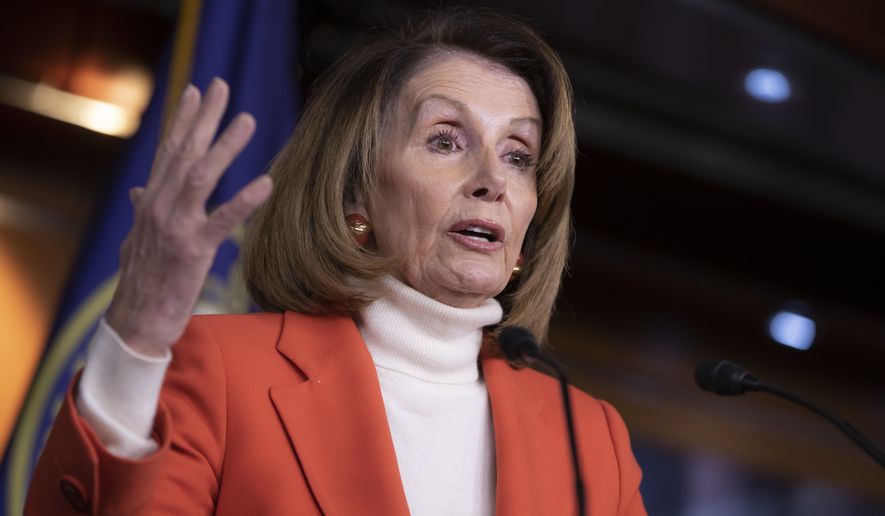Rep. Nancy Pelosi has offered to make rules changes that would open the House to more bipartisan cooperation, giving rank-and-file members more input on bills and committee action, as she seeks to strike deals and earn enough votes to lead the new Congress.
Her chief goal with the changes is to try to win over nine Democrats who are part of the bipartisan Problem Solvers Caucus, and who have said they would only vote for a new speaker who agreed to a lengthy list of changes.
Mrs. Pelosi has not agreed to the list, but has made some significant overtures, including allowing more time to read bills before they receive a vote and ensuring legislation generally goes through the committee process rather than be written by leaders behind closed doors.
A senior Democratic aide said Mrs. Pelosi had previously agreed to give floor time to any bill that gets 290 co-sponsors, to make committee membership more fair to each party, and to host an annual meeting to encourage bipartisanship.
It’s not clear whether that’s enough to convince the Problem Solvers.
They have a meeting scheduled with Mrs. Pelosi on Tuesday.
But she did win a significant victory Monday in earning backing from Ayanna Pressley, a young liberal star who won a House seat from Massachusetts, bolstering Mrs. Pelosi’s defense against critics who say she needs to give way to a new generation of leaders.
“My support for Leader Pelosi’s bid for speaker is motivated by her progressive track record and her express commitment to bring a background check bill to the floor as an early priority this Congress,” Ms. Pressley said.
The House Democratic Caucus will meet Wednesday to elect its leaders, and Mrs. Pelosi will only need to win a majority of her colleagues to be the party’s nominee for speaker.
Her bigger test comes Jan. 3, when the new Congress convenes and Mrs. Pelosi must win a majority of the whole House — 218 votes.
With Democrats expected to have 234 seats, that means she can afford up to 16 defections and still win without needing any Republican support.
The odds of Mrs. Pelosi, who served as the first female Speaker of the House from 2007 to 2011, winning back the top job in the House appeared to be shaky at times during the 2018 election cycle.
Republicans cast the election as a referendum on the 78-year-old and dozens of Democrats vowed to search for new House Democratic leaders.
But Mr. Pelosi remains the frontrunner — and, for now, the only option.
Rep. Martha Fudge of Ohio flirted with a challenge, but abandoned the idea last week after Mrs. Pelosi named her chairman of an elections-related subcommittee.
Rep. Brian Higgins of New York, who had signed a letter opposing Mrs. Pelosi, now says he’ll back her after she vowed to focus on infrastructure and expanding Medicare.
“She doesn’t have to win the support of all the critics, just enough to make caucus members believe she has the votes,” said Darrell M. West, director of governance studies at the Brookings Institution. “Once they think she has sufficient support, their opposition has collapsed because no one wants to be on the outs with the House speaker for a long period of time. If you are an intractable opponent, your legislation will never get approved.”
Mr. Higgins was one of 16 Democrats who’d signed the letter opposing Mrs. Pelosi. The other 15 have not publicly backed off their opposition.
Combined with the nine Problem Solvers Democrats, they could comprise a serious hurdle.
The Problem Solvers Caucus, both Democrats and Republicans, drew a red line during the midterm campaigns, warning that they would only back a speaker who would support a list of a dozen changes to how the House does business.
The nine Democrats appear to have slimmed those demands, releasing a statement Monday asking for Mrs. Pelosi to back three changes: They want floor time for any bill that gets 290 co-sponsors, votes on amendments to bills that have at least 20 Democratic and 20 Republican cosponsors, and a guarantee that all members will get a committee hearing on at least one bill.
“The bottom line is this: We need real rules reform to get bipartisan legislation heard — not just more committees to study the problem,” the group said in their statement. “Bipartisan legislation with broad support deserves honest debate and a simple up-or-down vote.”
But it’s not clear whether those are must-haves for them to support Mrs. Pelosi. A spokesman for Rep. Josh Gottheimer, the Democratic co-chair of the Problem Solvers, did not respond to a request for clarification.
Their stance hasn’t sat well with other Democrats.
Alexandria Ocasio-Cortez, who won a seat from New York, has called Mrs. Pelosi the most progressive candidate in the race, and said in trying to make the House more responsive to bipartisanship the Problem Solvers could be kneecapping liberals’ goals such as expanding government-sponsored health care.
“People sent us here to get things done, not ’negotiate’ with an [administration] that jails children and guts people’s healthcare,” she wrote on Twitter.
• Seth McLaughlin can be reached at smclaughlin@washingtontimes.com.




Please read our comment policy before commenting.